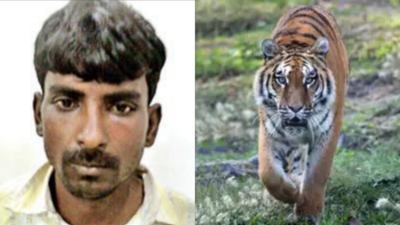‘Bone glue’ craze driving tiger poaching in central India; MP poacher arrested | Bhopal News

BHOPAL: ‘Tiger bone glue‘ is turning out to be the biggest worldwide threat to the endangered species, and the dense landscapes of central India – including Madhya Pradesh and Maharashtra – are at the heart of this growing illegal trade.
‘Tiger bone glue’ is made by pressure-cooking tiger bones for two-three days. The finished product is a brown, sticky sap-like substance that is sold in the form of cakes.It’s used in traditional medicine and is believed to cure muscle-and-bone ailments, increase vigour and is also used as an aphrodisiac.

The demand for ‘Tiger bone glue’ is rising so rapidly that even illegal tiger ‘farms’ in China, Vietnam – where it’s called ‘cao ho’ – and other parts of Southeast Asia are unable to match, said an officer. “Besides, buyers are willing to pay a hefty premium for ‘bone glue’ of wild tigers as it is believed to be more potent,” said a wildlife expert who has been tracking the trade for years. Asked why wild tigers are preferred, he remarked: “Think of the difference between broiler chicken and desi murga.”
And this is where prime tiger territory in Central India turned into a target for international poachers.
This was revealed after the recent bust of what forest officials call ‘the country’s largest poaching network’. Transactions of crores of rupees have been unearthed and linked to a gang of nomadic poachers run by MP-based Ajit Rajgond and an international syndicate, said officers.
The gang, arrested in Maharashtra last week, hunted tigers and leopards across India on the command of unidentified handlers, sources say. Officials haven’t said how many tigers were poached by this gang, but one officer said it was “shockingly high”.
MP tiger force has joined probe into poaching racket
The identity of the syndicate’s kingpin remains a mystery, but sources say the poaching network’s connections extend to neighbouring countries. Officers are trying to connect the dots. A team from MP’s Special Tiger Strike Force (STSF) has joined a multi-agency investigation into this global criminal trade spanning India, China and Vietnam.
“We have sent our team to Maharashtra and they are working in close coordination with local teams. The gang members were already wanted in poaching cases in MP,” said APCCF (wildlife)L Krishnamurteey.
Wildlife experts say ‘bone glue’ has become the primary driver in poaching of tigers and leopards. Investigators have tracked the arrested poachers’ mobile phone locations near areas around protected forests with dense tiger populations.
Wildlife activist Ajay Dubey is preparing to file a PIL for a CBI inquiry due to its international ramifications.
Krishna Acharya, general secretary of South Asia Wildlife Enforcement Network (SAWEN), shared his concerns with TOI, saying, “I am deeply worried by the alarming findings in World Wildlife Crime Report 2024, which highlight the persistent and evolving threats posed by illegal tiger bone trade. The increasing demand for tiger bone glue, particularly in Vietnam, is driving illegal poaching, trafficking, and exploitation of substitute species like lions and jaguars.”
Processing of tiger bone glue is shifting to source countries, further complicating enforcement, he said. “Despite global efforts, the illicit trade in wildlife products continues to rise, undermining international conservation goals. We urgently need stronger enforcement, transnational legal frameworks under UNTOC, and targeted demand-reduction campaigns to address this crisis. Without decisive action, we risk repeating history and pushing wild tigers toward extinction. The time to act is now,” he asserted.
Acharya pointed out that a 2024 report revealed that nearly 45% of consumers in Vietnamese urban centres admitted to using tiger bone glue, despite the lack of scientific evidence supporting its efficacy. Between January 2000 and June 2022, authorities worldwide confiscated parts equivalent to approximately 3,377 tigers, averaging about 150 tigers per year. The first half of 2022 saw a significant increase in seizures in countries like Indonesia, Thailand, and Russia, signalling a potentially escalating illegal trade.
A 2024 report by TRAFFIC highlighted a 185% increase in the number of tigers confiscated in Vietnam between 2018 and 2021. Given the country’s minimal wild tiger population, these seizures likely originated from illegal imports or captive facilities. Additionally, between June 2021 and July 2023, a study showed widespread availability of products from endangered species, including tigers, across major e-commerce and social media platforms in Vietnam.
“Research indicates that Vietnamese consumers prefer tiger bone glue derived from wild tigers over farmed ones, believing it to be more potent. This preference perpetuates poaching and illegal trade,” said the SAWEN member.
A major breakthrough in India’s largest poaching network came on Jan 25, when Maharashtra forest department arrested a notorious tiger poaching gang based in MP’s Katni. The arrest followed intelligence reports tracking the movement of a suspect from north India to their camp.
The gang’s leader, Ajit Rajgond, and his family members were apprehended in Bamanwada village near Rajura town.







